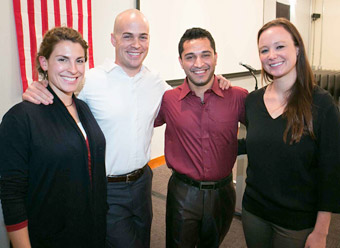
A hero’s welcome for Afghan interpreter Mohammad. Photos by Bruce Cook.
By: Susan Gluss
It was a moment more than three years in the making: Mohammad’s safe arrival on U.S. soil. The Afghan interpreter had served alongside Marines in Afghanistan, risking life and limb on military patrol. At a law school celebration last week—just days after arriving—Mohammad offered heartfelt thanks to supporters. He especially thanked Capt. Adrian Kinsella, now a second-year law student.
The two first met in 2010 when the now 24-year old Mohammad (who asked us not to reveal his last name) served as a translator for Kinsella’s platoon. “His work ethic was amazing,” Kinsella said. “He never complained. He warned us when locals were lying,” and he explained village taboos and customs. On patrol with U.S. Marines day and night, Mohammad was shot at twice and hit with an improvised explosive device.
“He proved his mettle by acting like a Marine,” Kinsella said. “We adopted him as one of our own.” They nicknamed him “Yoda.”
One year earlier, local Taliban forces had recognized Mohammad at a Marine base entry gate. In retaliation, insurgents tortured and murdered his father. When word reached Mohammad, he relocated his mother and siblings to Kabul, out of danger. But he stayed on patrol with the coalition forces.
By 2012, as the U.S. military started to withdraw, the Taliban struck again: They kidnapped Mohammad’s three-year old brother and held him for ransom. Mohammad had 24-48 hours to act or his brother would be killed.
“I couldn’t call the police because I was too scared. They said, ‘if you do anything smart, you will see your brother in a dead grave,’” he said.
Mohammad moved swiftly. He handed over his life savings of about 35-thousand dollars and rescued his little brother. At that point, Mohammad “was scared to leave the [military] base” because it “was the only safe place.” He couldn’t find work in Kabul because he was a marked man. His family at risk, he soon fled the country, taking his mother and siblings with him.
The quagmire

Cooper at the Berkeley Law party on Jan. 23.
See more photos here.
Mohammad had applied for a U.S. visa in 2010, but the urgency was even greater now. He sought support and guidance from Kinsella, his friend and platoon leader.
“It was a long, painful three and a half years,” Kinsella said. “I’m still surprised at how difficult it was just to get one man out, especially one as deserving of our protection as Mohammad. He has sacrificed so much.”
Despite certificates of merit and achievement, letters of recommendation, and news articles that advocated his case, Mohammad’s application languished.
Kinsella enlisted the help of fellow law students, including members of the Iraqi Refugee Assistance Project (IRAP) and the Boalt Association of Military Veterans (BAMV). At the law school gathering, he recounted some of their tireless efforts.
Bevan Dowd ’15 “spent countless hours helping with letters and op-ed drafts,” Kinsella said. May Whitaker ’14, the Berkeley IRAP chapter director, recruited her members to help brainstorm strategy. Sophie Cooper ’16, who recently interned on Capitol Hill, “got three congressional inquiries in one day”—resulting in a slew of phone calls to the U.S. State Dept. and U.S. Embassy in Islamabad.
Nearly a dozen members of congress joined the effort. Last fall, Rep. Barbara Lee (D-Calif.), asked the State Dept. to expedite the case “based on extenuating circumstances,” according to congressional aide Jonathan Gast.
“We’re thrilled that he beat so many odds to make it here,” Gast said. “We were all crossing our fingers.”
But it was Kinsella who spearheaded the entire operation and never wavered. In heart and mind, he fought for one thing only: to get Mohammad to safety.
“A veteran has borne witness to the notion that you leave no man behind,” Antonio Rossman, a Vietnam War vet and faculty member, told the crowd. “Even if a comrade has fallen, and you risk your life to bring him home.”
A new life
While Mohammad’s application for a Special Immigrant visa (SIV) stalled, he became eligible for a new program: An SIV with Chief of Mission approval for Afghans under “ongoing serious threat.” The visa was finally granted on December 23, 2013.
An estimated four to five thousand Afghans who worked for the U.S. military are still waiting for visas, many living in fear of retaliation. Mohammad is one of the lucky ones who escaped.
Mohammad arrived at the San Francisco airport on Martin Luther King, Jr. Day to a hero’s welcome as supporters greeted him on the concourse.
Despite the years of wait, worry, and family tragedy, Mohammad said he never lost hope. He knew he’d come to America because of Kinsella’s promise.
“I never gave up. I knew I’d get the visa one day because Adrian promised me that. He always said to me, ‘you’re going to get it, and I’m going to get it for you.’”
It’s been a remarkable journey, starting in Afghanistan, where he says “every place was a prison for me.” But he’s in a new country now, sharing an apartment with Kinsella and Aram Boghosian ’15, and embraced by the law school community. With a wide smile, he said, “I’m happy. I’m starting my life now.” Most of all, he told the rapt crowd, he wants “peace between all countries.”
See more images here: